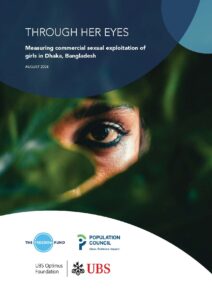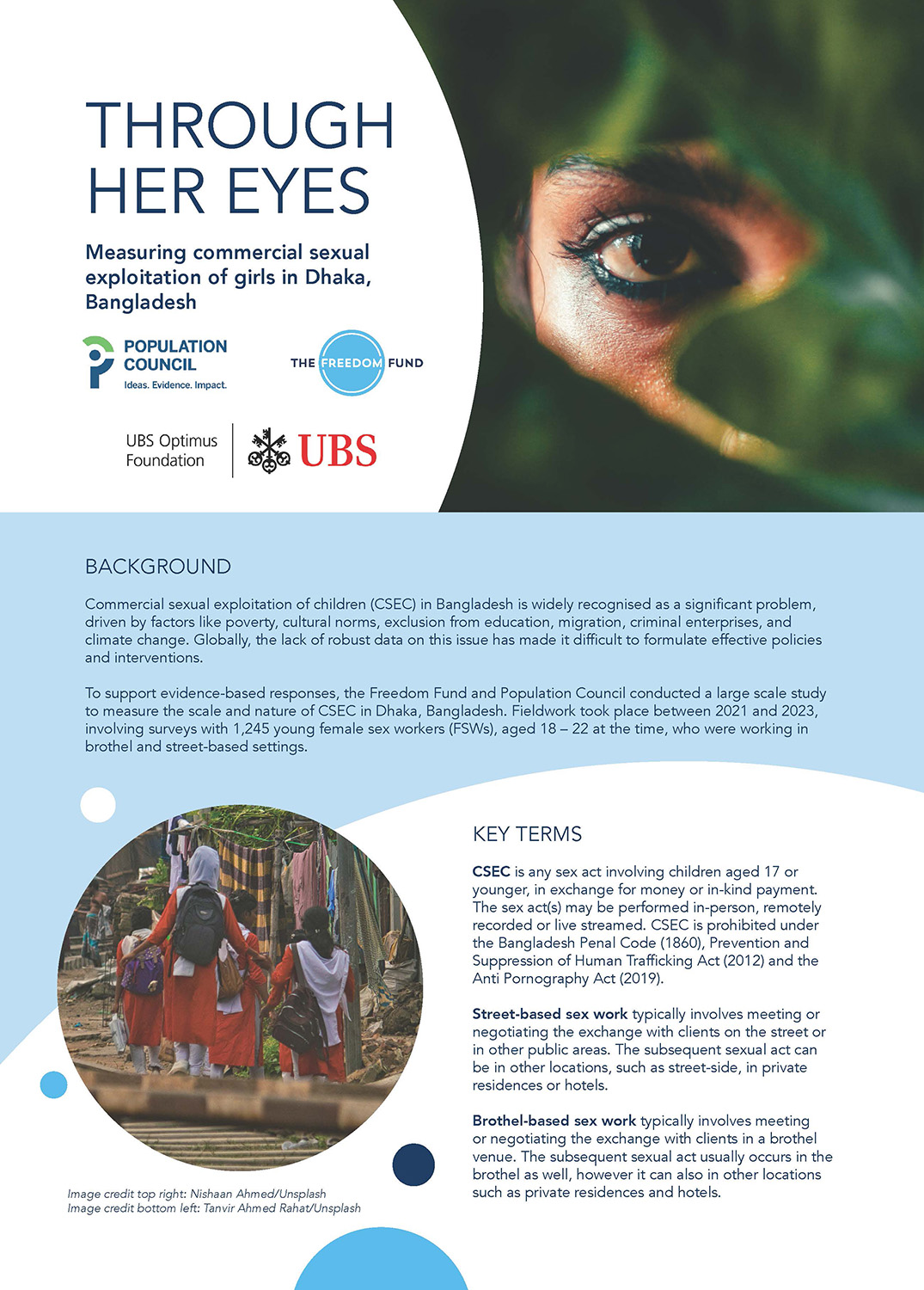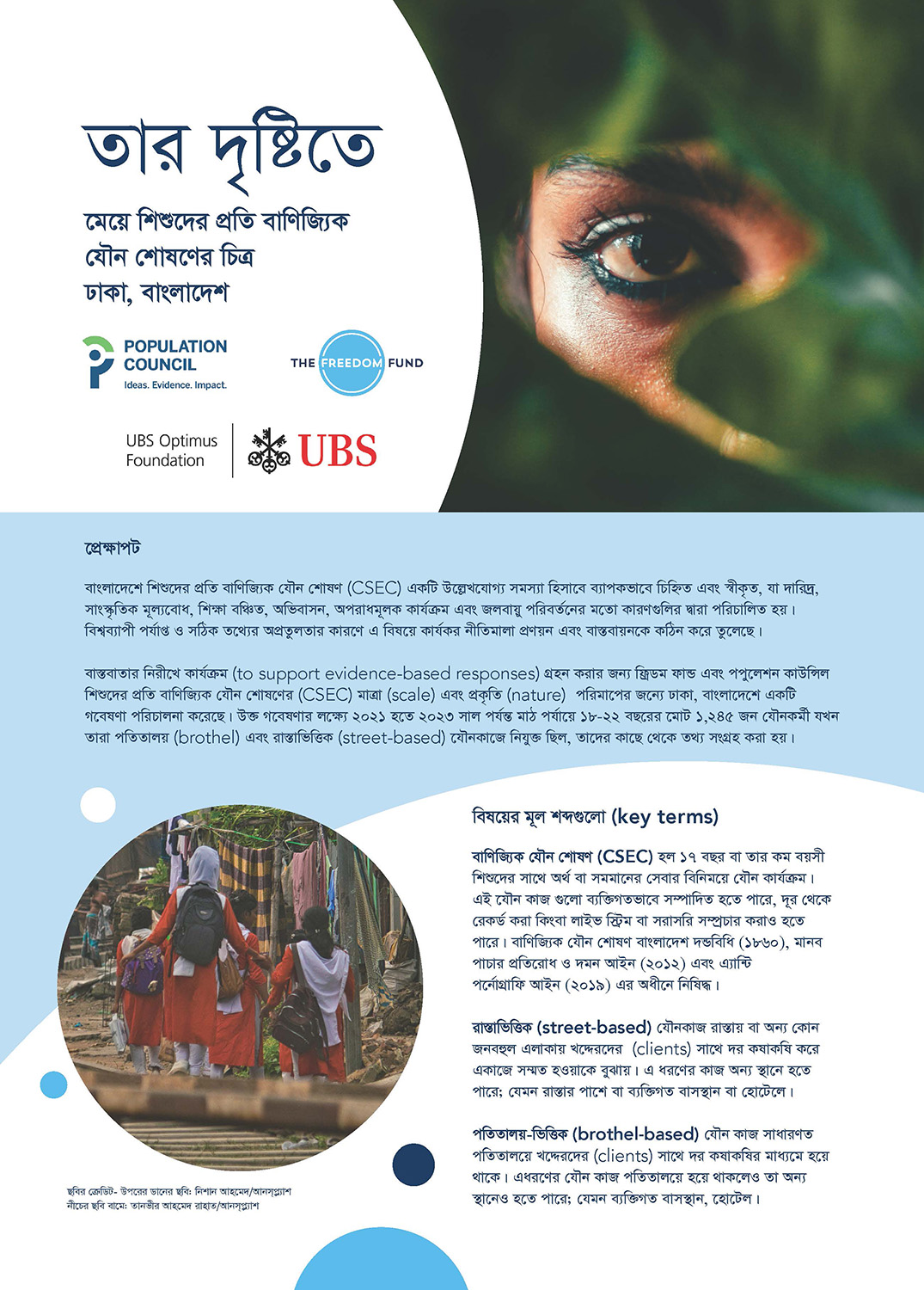Commercial sexual exploitation of children (CSEC) in Bangladesh is widely recognised as a significant problem, driven by factors like poverty, cultural norms, exclusion from education, migration, criminal enterprises, and climate change. Globally, the lack of robust data on this issue has made it difficult to formulate effective policies and interventions.
In Dhaka, the capital of Bangladesh, CSEC is prevalent in brothels, red-light zones, hotels, private residences, slums, and streets, where children face high levels of violence and coercion. Many children of brothel workers often enter the same trade, perpetuating a cycle of exploitation. Child survivors of commercial sexual exploitation face ongoing hardships, including living on the streets due to trafficking or poverty, or attempting to escape abusive family members.
Despite the severity of the issue, rigorous evidence on the extent and scale of CSEC in Bangladesh is scarce. The 2016 National AIDS/STD Control Programme estimates that over 15,000 girls and young women (age 10-19) are involved in commercial sex across Bangladesh, representing 14.9% of all female sex workers. This is likely an underestimate, as this national study focused on examining the health of sex workers rather than the exploitation of minors.
Insights from our latest study
To support evidence-based responses, Population Council in Bangladesh and the Freedom Fund conducted a large-scale study to measure the scale and nature of CSEC in Dhaka, Bangladesh. The surveys involved 1,245 young female sex workers in street settings in the Dhaka district as well as brothels in the Dhaka division.
Key findings
- Scale of CSEC in Dhaka: 22.2% of street-based and 21.9% of brothel-based female sex workers in Dhaka were estimated to be minors aged 17 or younger. This translates to roughly 5,000 girls in street settings in Dhaka district, and approximately 700 girls in brothel settings across Dhaka division.
- Reasons for entering CSEC: 80.1% of survivors cited needing money to survive as the primary reason for their first involvement in CSEC. More than half (55.7% street-based, 62.4% brothel-based) reported that refusal would have led to serious consequences, such as physical, sexual, or emotional violence, or deprivation of basic needs.
- Frequency of exploitation: Survivors recalled that while they were exploited as minors, they engaged in sexual acts with an average of 24.5 perpetrators* per week. Brothel-based survivors reported an average of 44.0 perpetrators per week, compared to 16.8 for street-based CSEC. (*in CSEC situations, this term is used in place of “clients” or “buyers”)
- Coercion and control: 59.1% of survivors described living in constant control while they were sexually exploited as minors, 46.8% were forced to work in conditions they had not agreed to, and 31.8% were prohibited from contacting family and friends.
- Experience of violence: 47.7% of CSEC survivors endured additional forms of physical, sexual, financial and emotional violence, with 23.9% reporting being locked up or kept in deprivation.
Recommendations
The findings from this study emphasise the need for stronger collaboration among various stakeholders. This includes policymakers, local government officials, law enforcement agencies and civil society organisations (CSOs). Their joint efforts are crucial in preventing CSEC and reducing its prevalence, as well as protecting adult female sex workers who are already engaged in sex work.
- CSOs and CSEC survivor groups to prioritise reaching at-risk children and vulnerable communities in areas where recruitment is likely to occur and to collaborate with government mechanisms such as such as Counter-Trafficking Committees (CTCs), Child Welfare Boards (CWBs) and community-based child protection committees (CBCPCs).
- CSEC survivors and CSOs to actively advocate for stronger enforcement of laws and comprehensive rehabilitation and reintegration support for survivors, while supporting the enhancement of CTCs, CWBs, and legal frameworks.
- CSEC survivors and CSOs to collaborate with statutory bodies to shift societal norms on CSEC and foster supportive attitudes towards survivors to transform perceptions towards CSEC.
- CSEC survivors, CSOs and government departments to collaborate on improving the financial resilience of vulnerable families including adult female sex workers, particularly mothers, to prevent their children from entering sex industry due to survival needs.
Click below to access the Through her eyes: Measuring commercial sexual exploitation of girls in Dhaka, Bangladesh report:
Access the Through her eyes three-page brief below in English and Bengla:






